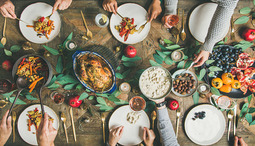- Om
- 31 Jul 2017
- læsetid
- 3 minutter
Here at BritainReviews we examine a wide range of companies, and as they all try and set themselves apart from competition, one word keeps cropping up: Organic. This can be with food, such as Coombe Farm Organic or Planet Organic, drink such as the Organic Wine Club, clothing such as Tailor Store or even personal care and cosmetics, such as Organic Surge. But do customers really understand what this label changes about the product they are buying? Most people have heard of organic food sources, but possible have only a vague understand of what this entails, and when clothing comes with a certificate of organic production, it is probably even less clear. The team at BritainReviews therefore thought it would be helpful to outline some of the basic on what it means when food or fabric is organic. What changes for the producer, for the environment, and for yourself, the customer?
Organic Food
The idea of organic food first originated in the 1940s as a response to the industrialisation of agriculture, but the trend has gained a lot of traction in the last 30 years, with consumers looking for food that is not chemically treated, made without unapproved pesticides, and fresh or minimally processed. By 2004, UK Organic Food sales had increased to £1.21 billion in 2004, up from £100 in 1994, which increased to £1.73 billion by 2010. As there is now significant money to be made, there are now European and UK laws in place to regulate standards organic food must reach. Therefore, if you are buying organic food, it is important to look for certificates of third party organisations that have exacting standards companies have tt reach to receive this certificate. Reliable companies to look for are the Soil Association, which is the leading organic certifier for the UK, or Freedom Food, which assesses hatcheries, farms, hauliers and abattoirs to make sure they are RSPCA welfare standards. These certificates ensure that food is raised without any pesticides or chemicals, and that the animals are raised and butchered ethically.
Benefits of this include decreased impact on the environment, with fewer chemicals, and less suffering for animals that are allowed to live in conditions they would be used to. It also means these chemicals and additives do not impact on the flavour of the product or the health of the consumer.
Organic Textiles
An increasing number of clothing producers highlight their sourcing of organic clothing, and the most commonly accepted organic criterion for fabrics is the Global Organic Textile Standard (GOTS). It was set up in 2006 as a clearly defined set of requirements for a company to be recognised as organic, holding them to account all the way from the harvesting of the raw materials to the environmentally and socially responsible manufacturing of the products. This means that when a company has the GOTS certificate, their fibre-farming, production methods, employment standards and working environment are all held to international and national standards, meaning no damage to the environment or the people employed. Since its founding, it has shown to be very popular both due to the recent increase in people that care about organic fibres but also as a unified processing criteria from the industry and retail section, gaining better recognition.
The products that are check can be anything from clothing, baby clothing, sports clothing, home textiles. The companies that are taking on the mantle of this organic movement are generally start-ups, looking to sow good roots for their company, and cater to a new generation of environmentally and socially conscious customers. Examples of these are Tailor Store making shirts, and Frugi making baby clothing.
Controversy?
Forbes recently wrote an article arguing people paying extra for organic produce are being ripped off. The author argued this by saying that the health reasons people give for buying organic food is unfounded and also that organic companies could quite easily be cheating the standard, because there is no way of proving if something is organic. They did, however, fail to address the ethical side of animal-raising. Do you think either are important? At the end of the day it is up to you, what you prioritise, and whether organic products are important for you.
Image: Nate Bolt








